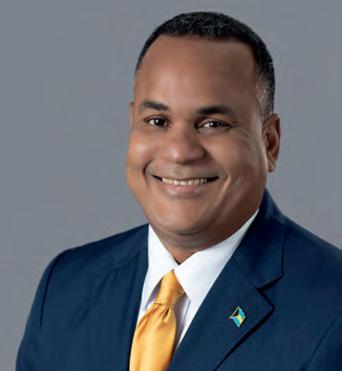
3 minute read
TIMELINE A brief history of financial services in The Bahamas
THE BAHAMAS
Timeline:
Advertisement
Financial services in The Bahamas
NASSAU
NOW ACCOUNTING FOR ABOUT 20 PER CENT OF THE BAHAMAS’ GROSS DOMESTIC PRODUCT, ITS FINANCIAL SERVICES INDUSTRY HAS EVOLVED INTO A HIGHLY SOPHISTICATED, SUCCESSFUL SECTOR. READ ON TO DISCOVER THE KEY MILESTONES FROM THE PAST 100 YEARS OF INNOVATION AND TRANSFORMATION.
1908
• The Royal Bank of Canada opens in The Bahamas.
1930s–1940s
• ‘A critical mass of big money began flooding into the country … due to the beneficial tax environment.’ – The Bahamas Investor
1955
• American industrialist Wallace Groves invests in Grand Bahama, creating a tax- and duty-free zone under the 1955
Hawksbill Creek Agreement.
1968
• A subsidiary of UBS AG, established as
Swiss Bank Corp (Overseas) Ltd, is the first of the Swiss banks to take a foothold in The Bahamas.
1970s–1980s 2000
• The Government of The Bahamas passes a package of nine anti-money laundering and counter-financing of terrorism laws.
• The country becomes increasingly discriminating about who can operate in the sector and who can be brought in as clients.
• A 1970 law triggers the growth of the insurance industry in The Bahamas.
2003
• The Investment Funds Act, 2003 repeals the
Mutual Funds Act, 1995 and introduces the
Specific Mandate Alternative Regulatory Test
Fund (SMART Fund) as an additional style of collective investment vehicle.
1965 1995
• The Mutual Funds Act, 1995 is passed.
2004
• Enactment of the Banking Act of 1965, a deliberate effort to put the banking industry on a solid footing.
1998
• The Trustee Act, 1998 comes into force (see box). • The Foundations Act, 2004 comes into force, providing for the creation of private foundations in The Bahamas. Foundations have their origin in civil-law countries.
Future of insurance
Today, The Bahamas’ insurance industry is divided into two distinctly separate markets – domestic and external/international. Legislative reform is on the horizon to merge the legislation governing insurance.
TRUSTS
Much of the common law relating to trusts in The Bahamas has been supplanted by innovative statutory reform. The Trustee Act, 1998 (the Act) is the embodiment of that reform and provides the cornerstone of Bahamian trust legislation. One innovative feature of the Act is its displacement of the rule in Saunders v Vautier by barring beneficiaries from terminating or modifying a trust if such action would defeat a material purpose of the settlor in creating the trust. Additionally, the Act permits an extensive arrangement of powers to be reserved to the settlor. The most recent amendments to the Act were made in 2016 to re‑assert the rule in Re Hastings‑Bass.
Did you know?
The Bahamas has promised to generate at least 30 per cent of its energy from renewable sources by 2030. The island nation plans to invest the money from selling blue carbon credits in renewable energy and other green projects.
2012

• The Executive Entities Act, 2011 comes into force. It is designed to facilitate the creation, operation, management and termination of a new private wealth structure, the Bahamas
Executive Entity (BEE). A BEE is ‘a legal person established by a Charter to perform only executive functions and registered in accordance with the Act’ and is ‘able to sue and be sued in its own name’.
2014
• The Investment Condominium Act, 2014 (ICON Act) is enacted. The ICON is intended to be an alternative to a traditional company, unit trust or exempted limited partnership vehicle for use in relation to investment funds.
It is modelled on the Brazilian ‘condominium’ concept of pooling assets for collective investments in an unincorporated manner akin to the concept of joint ownership and administration of property, which is well understood in the civil-law jurisdictions of
South America.
2018
• The Bahamas meets the OECD’s 30 September deadline to implement automatic tax information exchange with 35 partner jurisdictions.
• Economic substance legislation comes into force on 31 December.
• The Register of Beneficial Ownership Act, 2018 provides for the establishment of an electronic database of beneficial ownership for legal entities registered in The Bahamas.
2020
• The passage of the Digital Assets and
Registered Exchanges Act, 2020 puts in place the legal framework for those interested in entering the digital asset space. The Bahamas is planning further continued refinement of digital assets legislation to address matters such as stable coins.
• The Investment Funds Act, 2019 (as amended) and Investment Funds Regulations, 2020 repeal and replace the Investment Funds
Act, 2003 and Investment Funds Regulations, 2003, respectively.











